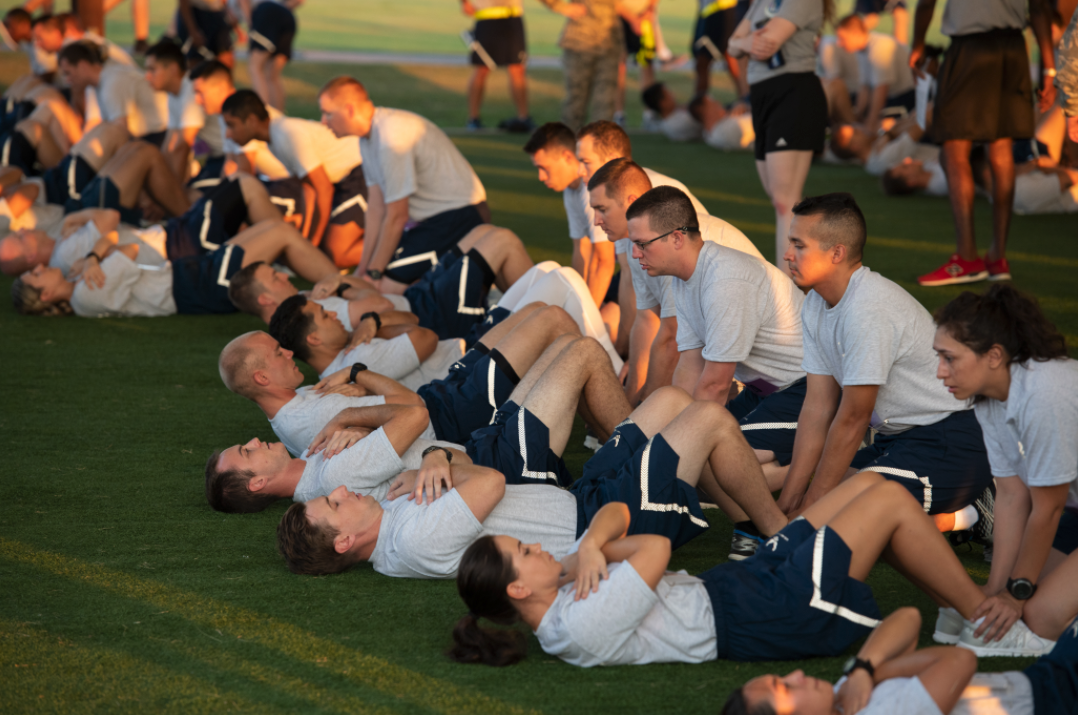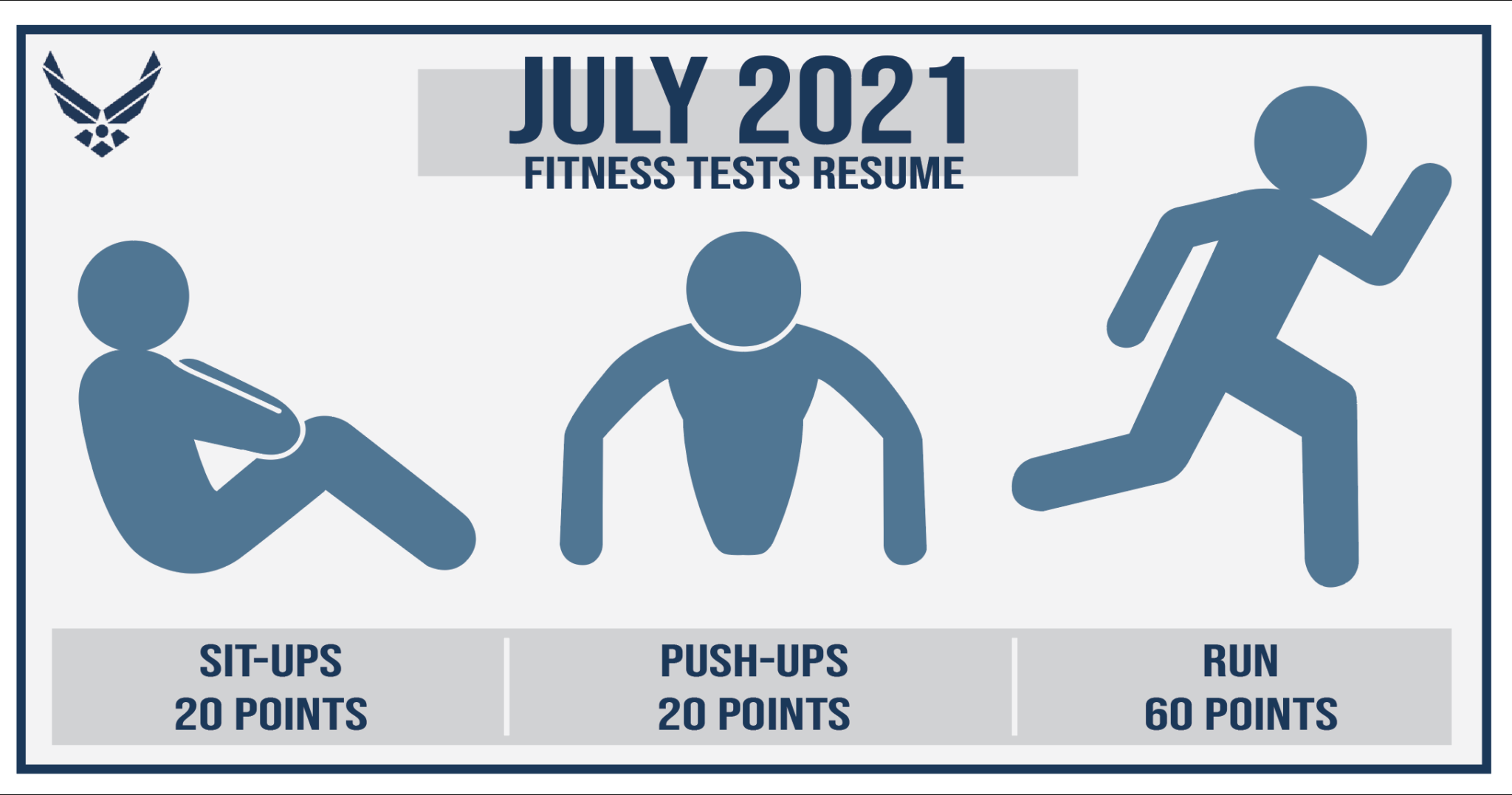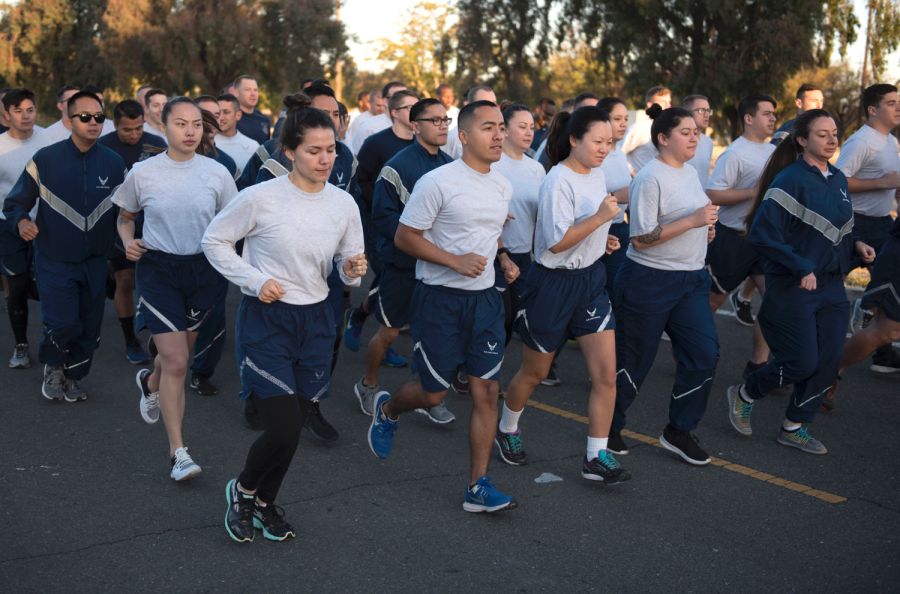
- The App
- Sandboxx News
- Resources
Learn
- Company
About
Become a Partner
Support
- The App
- Sandboxx News
- Resources
Learn
- Company
About
Become a Partner
Support
As of July 1, the Air Force will begin a new iteration of its fitness test that eliminates waist measurement as a scored component. The...

As of July 1, the Air Force will begin a new iteration of its fitness test that eliminates waist measurement as a scored component. The new test will assess Airmen fitness levels via three categories: push-ups, sit-ups, and a 1.5-mile run.
Here’s everything you need to know about what’s different about the Air Force fitness test in 2021, how each event is scored, and you can make sure you pass with flying colors.
While waist measurement is no longer a consideration for the Air Force fitness test, it remains a consideration for the branch itself. In a statement issues in May, the Air Force indicated that waist measurement will continue and may even be conducted during a fitness test for the sake of scheduling.
“The waist measurement will no longer be required as part of the physical fitness test but a separate assessment of body composition, as required by DoD Instruction 1308.3, will continue starting in October,” the release reads.
“Testing for body composition may continue to use some form of waist measurement and may be administered during PT testing to reduce scheduling and administrative burdens, but body composition will not be a component of the PT test itself. Further details on the body composition program will be released at a later date.”
Related:

As the Air Force continues to fine-tune its fitness test, the branch intends to offer more options for scored activities. Once these options are announced, Airmen and fitness monitors will be given six months to learn and practice these alternative options before being able to utilize them for scored testing.
“We are moving away from a one-size-fits-all model,” said Air Force Chief of Staff Gen. CQ Brown, Jr.
“More testing options will put flexibility in the hands of our Airmen – where it belongs. We know not all Airmen maintain their fitness the same way and may excel in different areas. Alternate components provide choices while still providing a mechanism to determine overall fitness.”
The Air Force expects these new options for the fitness test to count for score by January of 2022.

The Air Force Fitness Test is broken down into three scored categories in 2021: upper body, abdominal, and cardio. Each event is worth a certain number of points, with a perfect score totaling at 100.
Failing to meet the minimum score required for your age group in any of the three events will result in an overall failure in the Air Force fitness test. Airmen must also achieve a minimum of 75 total points in order to pass.
Scoring breaks down as such:
Minimum scores for each event are based on the member’s age and gender. You can find a complete score chart for all members by following this link.

The following commonly asked questions and answers about the Air Force fitness test were provided by the Air Force Personnel Center. You can find their original document here.
Q. What is the new point breakdown without the A/C component? When is this effective?
A. After removing the abdominal circumference as a scored component of the physical fitness
assessment, points were redistributed. Push-ups and sit-ups will increase from 10 to 20 points
each, with the 1.5 mile run remaining at 60 points, effective July 1, 2021.
Q. Why is the cardio component so heavily weighted?
A. Revised scoring remains at 60 points for the aerobic component and reflects continued
emphasis on cardio-vascular fitness. While it is not the only aspect of health and readiness,
aerobic fitness remains one of the most essential elements for readiness and health.
Q. Why are we changing to five-year age groups? When is this effective?
A. These changes are in response to what Airmen have asked and what the Air Force Physical
Fitness Working Group determined was the best way forward. This is effective July 1, 2021.
Q. If a member does not meet the minimum component score, is it possible to pass the test?
A. No, in order to pass the physical fitness assessment a member must 1) achieve a composite
point total greater than or equal to 75 points and 2) meet the minimum point values for all
components tested on.
Q. Are any of the rules for fitness failures going to change or do the same rules apply?
A. No. All the same rules for fitness failures will still apply.
Q. How will body composition be measured? When will that be implemented?
A. The body composition program will be separate from the physical fitness assessment and
resume October 2021. Further details on the body composition program, as required by
Department of Defense Instruction 1308.3., will be released at a later date.
Q. If I am on a profile for one component, does my Primary Care Manager (PCM) or
Primary Care Provider (PCP) have to exempt me from the alternate option, as well?
A. Yes, if a member is on a profile their PCM or PCP must identify which components they are
exempt from.
Q. Can members test using a combination of the old and new cardio and strength
components? Will members have the option to choose what they like best?
A. Yes, once the new components are implemented in January 2022, members will have a choice
on which testing options they choose for their physical fitness assessment. More information is
expected to be released this summer.
Q. If it is a choice, when will members have to decide what components they will test in?
A. Members must decide their components in conjunction with the completion of their Fitness
Screening Questionnaire and provide it to their Unit Fitness Program Manager for review prior to
their assessment. If they don’t make a determination, member will test on the regular
components.
Q. Will the updates and new options change the pregnancy exemptions and post-partum
exemptions?
A. No.
Q. Will the new physical fitness assessment changes be implemented at Basic Military
Training?
A. Yes.




